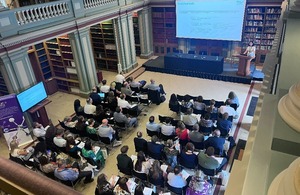Government Chemist Conference 2023 - Report
A report on the 2023 Government Chemist conference on 20-21 June

The Government Chemist Conference 2023, Safe food for tomorrow’s world – food security in challenging global conditions, was hosted on 20-21 June at the Royal Society of Chemistry, Burlington House, London. It was the first time in five years that colleagues and stakeholders in the field were able to get together in person to discuss challenges and opportunities in ensuring global food security, authenticity, safety and sustainability.
The conference was attended by over 100 people in-person and 30 people online from organisations in government, industry, law enforcement and academia. Feedback was very positive; 100% respondents would recommend attending Government Chemist events.
Julian Braybrook, Government Chemist, welcomed all to the conference. The first session ‘Drivers for resilient official food control systems’, was chaired by Lucy Foster, Defra and was opened by Henry Dimbleby who gave a keynote lecture reflecting on the state of the UK food system and the challenges we must address for a healthy population. Paul Hancock, from the Office of Government Chemist, shared the outcomes from recent referee cases and Jessica Burt, Food Law Group, presented on the implications and opportunities resulting from possible changes in UK food and feed law. After lunch, an interactive session jointly organised by NFCU and SFCIU explored the strengths and weaknesses of the information sharing systems in food crime cases.
Helen Pain, RSC, chaired the second session focused on ‘Authentic and safe food’. Rosario Romero, Fera, discussed the growing interest in alternative proteins such as plant-based, insects, precision fermentation, cultivated meats and single-cell species and the associated authenticity challenges. Speakers from Food Standards Scotland (FSS) and Food Standards Agency (FSA) discussed regulatory perspectives; Geoff Ogle presented FSS’s strategy for safe and authentic foods in an ever changing food system and Sam Faulkner presented on FSA’s strategy to regulate the UK food system discussing foodborne disease and antimicrobial resistance and novel foods. Jane White and Jon Griffin, from the Association of Public Analysts, provided an insight into the positive impact government funding has had on supporting the work of Public Analysts in Official Control Laboratories across England, Scotland and Wales. A panel session discussing ‘What does green mean? How do laboratories, industry and academia comply with requirements for sustainability’ concluded Day 1 of the conference.
The second day of the conference focused on solutions to the challenges facing the UK food system. The morning session ‘New and emerging technologies’ was chaired by Sterling Crew, ISFT. Professor Guy Poppy opened the session with a presentation on how UKRI are investing into scientific research and innovation to support a healthy, prosperous and sustainable future. Vittorio Fattori, FAO, presented on emerging issues in food safety and the importance of foresight from FAO’s perspective. Michael Ellis, Defra and Chris Stockdale, FSA presented on the respective regulatory perspectives on The Precision Breeding Act. Petra Hanga, Quest Meat, provided an overview of the emerging area of cultivated meat, the state of the industry and market firsts before Brian Quinn, Queens University Belfast, presented on the technical approaches to discern country of origin of soybeans and how this links to the fight against the agricultural deforestation associated with the production of soya products.
The final session of the conference was chaired by Simon Branch, Herbalife. Andrew Clark, National Farmers’ Union (NFU), introduced the session on ‘Solutions to challenges in food production’ with a presentation on the challenges in producing food that is both in the interest of farmers and affordable to the consumer. Malcolm Burns, LGC, presented on traceability of genomic edited products and Michele Stanley, SAMS, presented on macro and microalgae as an alternative food source and the potential and associated risks. Romy Wilkin, Jones Food Company, provided an insight into the process of vertical farming, and how this innovative area can support future food and nutrient security. Louise Manning, University of Lincoln, concluded the conference with a presentation highlighting how emerging climate-related stress factors, such as forest fires, impact on food safety and reflected on the role of laboratories in the prevention and detection of these hazards. Selvarani Elahi, Deputy Government Chemist, provided the closing remarks.
Conference attendants were able to explore and discuss the many global threats and challenges facing the UK food system, considering the current geopolitical, environmental and economic conditions. Whilst the overview might have appeared bleak, the conference also provided an insight into possible solutions and mitigation tools to help ensure safe food for the future.
The 2023 Government Chemist Conference presentations - GOV.UK (www.gov.uk)